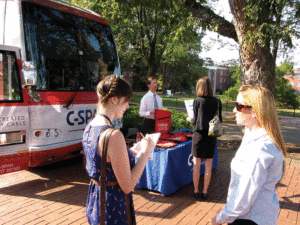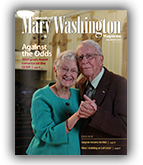
C-SPAN returned to campus to film UMW experts for its Fredericksburg Weekend in September. Last year, the C-SPAN Campaign 2012 bus (above) visited Ball Circle to film and teach students about political campaigns. Photo provided by C-SPAN.
When C-SPAN wanted to feature Fredericksburg in its 2013 Cities Tour, its film crew found a lot to talk about at the University of Mary Washington.
C-SPAN visited two UMW authors, the UMW James Farmer Collection, and the James Monroe Museum and Memorial Library for part of its weekend-long broadcasts in late September. You can still see the broadcasts online at c-span.org/LocalContent/Fredericksburg.
Videos from UMW:
Timothy O’Donnell, professor of communications, talked to C-SPAN about UMW’s James Farmer Collection, housed in the Simpson Library archive. The video includes O’Donnell’s narrative about Farmer’s life as a major player in the struggle for civil rights, and footage of the late professor of history’s lectures to Mary Washington students. In the classroom scenes, Farmer − who had been scheduled to speak at the 1963 March on Washington − recalls watching the march on TV from a Louisiana jail cell where he and others were locked up for civil disobedience.
Jeffrey McClurken ’94, professor of history and American studies, was recorded for C-SPAN’s Book TV about his Take Care of the Living: Reconstructing Confederate Veteran Families in Virginia. McClurken traces how Virginia went from depending on families, churches, and local elites to aid Virginians devastated by the war to implementing a social welfare system that ran mental institutions and provided monetary aid.
Stephen Farnsworth, professor of political science and international affairs, spoke about his book The Nightly News Nightmare and how broadcast coverage has declined from providing substance to trivia. Comparing the late 1980s − when most Americans relied on nightly TV news for information − to today’s “junk food journalism” diet of attention-grabbing sound bites, Farnsworth and co-author Robert Lichter ask whether the media are upholding their responsibility to inform the public.
Scott Harris ’83, director of the James Monroe Museum, walked the film crew through the downtown Fredericksburg location of Monroe’s office, where the museum − administered by UMW − stands. Harris shared Monroe’s history, including his service at Valley Forge and his rise from Fredericksburg city councilman to fifth president of the United States.
Daniel F. Preston, editor of The Papers of James Monroe, described curating Monroe’s papers and documents to illustrate how Monroe, through his decisions and actions, influenced the formation of the United States.
